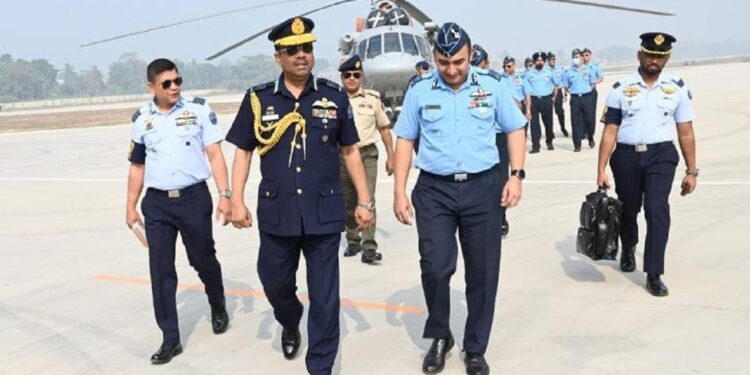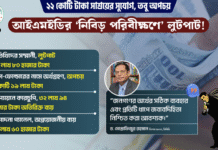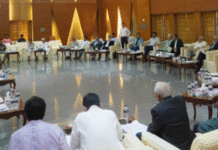Even as visa restriction policy was in force, BAF chief’s visit was aimed at exploring possibilities of acquiring four Bell helicopter

Bangladesh Air Force chief, Air Chief Marshal Shaikh Abdul Hannan during his visit to Air Force Station Barrackpore, West Bengal, in December 2022. (Photo: Twitter)
The visa denial by the US and Canada to Hannan comes four months after the State Department, acting in ways to “support Bangladesh’s goal of holding free, fair and peaceful national elections”, announced a new sweeping policy which empowers the US “to restrict the issuance of visas for any Bangladeshi individual, believed to be responsible for, or complicit in, undermining the democratic election process in Bangladesh”.
In an official note on May 24 this year, the US State Department categorised “current and former Bangladeshi officials, members of pro-government and opposition political parties, and members of law enforcement, the judiciary, and security services”. The US authorities notified the Bangladeshi government of this “decision” on May 3, 2023.
Air Chief Marshal Hannan is the senior-most Bangladesh armed forces officer denied US and Canadian visas. Well-placed and informed sources in Bangladesh’s current power structure disclosed to Northeast News that not only did the US and Canadian authorities rejected Hannan’s visa applications, they also denied visa to his spouse. Hannan was appointed Bangladesh Air Force (BAF) chief in June 2021, succeeding Air Chief Marshal Masihuzzaman Serniabat.
According to the sources, Hannan’s objective in visiting the US and Canada was to explore the possibilities of acquiring four Bell helicopters for the BAF at a time when Bangladesh’s armed forces have made significant acquisitions of military hardware from China, thereby raising India’s hackles.
In August 2022, there were credible reports that indicated that Bangladesh had procured 36 F-7BGI multi-role aircraft from China’s Chengdu Aircraft Corporation. BAF had shown keen interest in acquiring eight advanced Chinese F-7 MG aircraft in 2000 following a deferred payment offer by Beijing. BAF’s fleet of current fighter aircraft includes two squadrons of F-7 MBs, besides an assortment of other Chinese and Russian fighter planes, including the Yak-130 and MIG-29UB and Antonov An-32, among others.
BAF also reportedly operates a host of helicopters, including the Bell UH-1N, Bell 206 and Mi-17 (both American), and military-purpose choppers acquired from Russia, Italy, Czech Republic and Germany.
While it is yet not clear whether the Joseph Biden administration will consider imposing measures stronger and more effective than just visa restrictions on key Bangladeshi individuals and officials, the May 24 public announcement observed that the “holding of free and fair elections is the responsibility of everyone – voters, political parties, the government, the security forces, civil society and the media”.
At that time, US Secretary of State Antony J Blinken had declared that the new visa policy was being set in motion to “lend our support to all those seeking to advance democracy in Bangladesh”.









